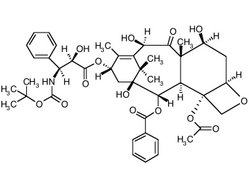GPC Biotech AG (Frankfurt Stock Exchange: GPC; TecDAX index; NASDAQ: GPCB) has announced that the company presented data on its lead drug candidate satraplatin at the 96th Annual Meeting of the American Association for Cancer Research (AACR).
"The data presented at AACR indicate that satraplatin remains active in drug-resistant tumor cells pre-treated with other commonly used anticancer drugs," said Marcel Rozencweig, M.D., senior vice president, Drug Development. "These in vitro data support our plans to initiate additional clinical trials evaluating satraplatin in combination with a variety of other anticancer treatments, including a Phase 1 study with TAXOTERE (docetaxel), which is planned to start in the next few months."
A poster entitled, "Evaluation of the efficacy of satraplatin (JM216) and its major metabolite JM118 in drug resistant cells and in combination with docetaxel" (Abstract #1387), reviewed the results of a study designed to explore the activity of satraplatin in several drug-resistant human tumor cell lines, including those resistant to taxanes, mitoxantrone, etoposide, camptothecin and cisplatin. All of these drugs are used widely for the treatment of various cancers. The study results showed that the pre-treated cells remained sensitive to satraplatin, thereby providing a rationale for evaluation of satraplatin in patients who have progressed on these other cancer treatments.
In addition, researchers evaluated the effect of a combination of TAXOTERE and satraplatin on prostate cancer cells. The results indicated that, when these cells are exposed first to TAXOTERE and then to satraplatin, there appears to be a synergistic effect. When the cells were exposed to the two compounds at the same time, only an additive effect was observed. The results are supportive of studying a combination treatment of TAXOTERE and satraplatin in human clinical studies, including evaluating sequential regimens. Compounds that are given orally, like satraplatin, offer greater flexibility in terms of dosing administration and scheduling compared to IV-administered drugs. GPC Biotech plans to initiate a Phase 1 trial evaluating a combination treatment of satraplatin and TAXOTERE in the next few months.
About Satraplatin
Satraplatin, an investigational drug, is a member of the platinum family of compounds. Over the past two decades, platinum-based drugs have become a critical part of modern chemotherapy treatments and are used to treat a wide variety of cancers. Worldwide sales of these drugs exceeded $2.2 billion in 2004. Unlike the platinum drugs currently on the market, all of which require intravenous administration, satraplatin is an orally bioavailable compound and is given as capsules that patients can take at home. An oral platinum drug could offer key advantages, including ease of administration and patient convenience, in a variety of applications. Additionally, satraplatin is the only platinum-based compound to have shown efficacy in a randomized clinical trial in prostate cancer. Prostate cancer is the most common cancer among men in the U.S. and Europe. The number of patients with this disease is expected to increase with the aging population. As the disease advances, patients are often treated with hormone therapy. Once patients fail hormone therapy, becoming hormone-refractory, follow-on treatment involves a limited number of options, including chemotherapy. For patients who then fail first-line chemotherapy, there are currently no approved second-line chemotherapy regimens.
Satraplatin is in a Phase 3 registrational trial - the SPARC trial - as a second-line chemotherapy treatment for HRPC. GPC Biotech has successfully completed a Special Protocol Assessment with the U.S. FDA and has received a Scientific Advice letter from the European regulatory authority, the European Agency for the Evaluation of Medicinal Products (EMEA). The FDA has also granted fast track designation to satraplatin for this indication.
Phase 2 trials have been completed in HRPC, ovarian cancer and small-cell lung cancer. Promising early clinical results have also been shown when satraplatin is combined with radiation therapy, and a Phase 1/2 study evaluating this combination in patients with non-small cell lung cancer has been initiated. Additional studies evaluating satraplatin in combination with other therapies in various cancers are planned. Further information on satraplatin can be found in the Anticancer Programs section of the company's Web site at http://www.gpc-biotech.com.
GPC Biotech AG is a biopharmaceutical company discovering and developing new anticancer drugs. The company's lead product candidate - satraplatin - is currently in a Phase 3 registrational trial as a second-line chemotherapy treatment in hormone-refractory prostate cancer following successful completion of a Special Protocol Assessment by the U.S. FDA and receipt of a Scientific Advice letter from the European central regulatory authority, EMEA. The FDA has also granted fast track designation to satraplatin for this indication. Satraplatin was in-licensed from Spectrum Pharmaceuticals, Inc. Other anticancer programs include: a monoclonal antibody with a novel mechanism-of-action against a variety of lymphoid tumors, currently in Phase 1 clinical development, and a small molecule broad-spectrum cell cycle inhibitor, currently in pre-clinical development. The company is leveraging its drug discovery technologies to elucidate the mechanisms-of-action of drug candidates and to support the growth of its drug pipeline. GPC Biotech also has a multi-year alliance with ALTANA Pharma AG working with the ALTANA Research Institute in the U.S., which provides GPC Biotech with revenues through mid-2007. GPC Biotech AG is headquartered in Martinsried/Munich (Germany). The company's wholly owned U.S. subsidiary has research and development sites in Waltham, Massachusetts and Princeton, New Jersey.
For more information, visit http://www.gpc-biotech.com or call 212/845-4239.
COPYRIGHT 2005 Worldwide Videotex
COPYRIGHT 2005 Gale Group



